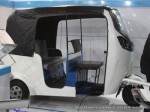Mahindra and Tata Motors to get subsidies upto Rs 1.5 lakh on Electric vehicles
Government is readying itself up to provide manufacturers with subsidies for promoting sales of electric vehicles.
New Delhi: Electric/hybrid vehicles and bikes could get alluring alternatives for the Indian purchaser, with the Center wanting to offer equitably extensive subsidies going from Rs 8,000 up to Rs 12 lakh to the manufacturers.
The move will give a help to homegrown auto majors Mahindra & Mahindra and Tata Motors, both of which have been creating electric and hybrid vehicles.M&M, which has propelled the e2o electric car is holding up for motivating forces before it launches other electric models like an electric Verito and Maxximo LCV.
Tata has generally created a CNG-hybrid bus, running in Madrid, which ise yet to be sold in India in view of the high cost of over Rs 1 crore but after the subsidy kicks in, expect it to be subsidised by Rs 12 lakhs if and when it launches in India.
“The idea is that 30-40% of the price differential of XeV over petrol/diesel cars will be met by the subsidy. After that, such vehicles make sense because the running cost is very low. The subsidy is expected to cost the government abut Rs 12,000 crore over six years,” a government official told the good guys back at the Financial Express.
XeV cars and SUVs which are valued at Rs 7.5 lakh onwards, are required to get financed by up to Rs 1.5 lakh, while XeV bicycles and bikes (beginning R40,000) will probably get sponsored to a greatest of Rs 30,000, thus bringing down their prices considerably.
Hybrid buses will get an enormous support with an arranged subsidy roof of around Rs 12 lakh, while XeV light commercial vehicles will probably get financed by Rs 1 lakh. The careful subsidy will rely on upon different components like reach, battery size and the genuine manufacturing plant cost of the vehicle.
The fundamental point of the government is to sponsor no less than 30-40% of the additional value differential of ELectric Vehicle over petrol vehicles and this subsidy will require the administration give or take Rs. 2000 crore consistently. The service will repay the subsidy to producers with the assistance of an online gateway and this methodology will happen in two steps – first the organization will need to give an evidence of offer at the industrial facility gate where excise duties are paid and afterward the receipts for the vehicle’s enlistment will need to be given. In 2013 January, Prime Minister Manmohan Singh advertised the National Electric Mobility Mission Plan 2020 to push a greener and less dirtying transport framework for the nation and these subsidies are a piece of that procedure.







